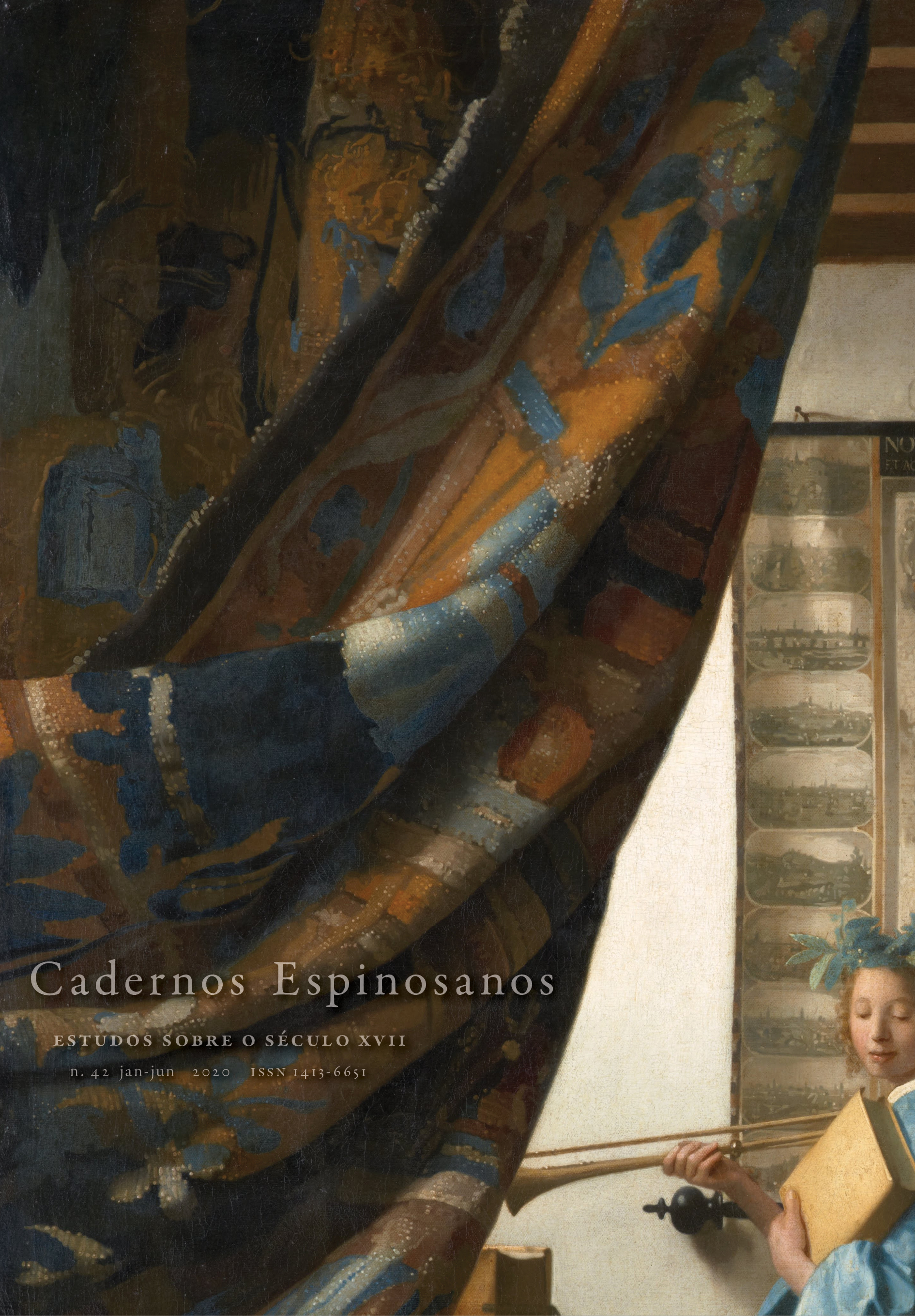THE ROLE OF IMAGINATION IN HOBBES’ POLITICAL PHILOSOPHY
DOI:
https://doi.org/10.11606/issn.2447-9012.espinosa.2020.162092Keywords:
Hobbes, Imagination, Reason, Passions, MoralAbstract
The objective of this paper is to examine the role of imagination in Hobbes’s political philosophy. We argue that Hobbes’s reflections on imagination lead him to distinguish between prudence and reason, which is a key distinction in his political philosophy. The institution of sovereignty consists precisely in overcoming the dimension of prudence by means of reason. Thus, Hobbes’s political philosophy involves the replacement of a sphere of power relations, the realm of imagination, with a sphere of law relations in the civil state, the realm of reason.
Downloads
References
Brandt, F. (1928). Thomas Hobbes’ mechanical conception of nature. London: Hachette.
Gauthier, D. (1969). The Logic of Leviathan: The moral and Political Theory of Thomas Hobbes. Oxford: Clarendon Press.
Hampton, J. (1986). Hobbes and the Social Contract Tratidion. Cambridge: Cambridge University Press.
Hobbes, T. (2002). Do Cidadão. Tradução de Renato Janine Ribeiro. São Paulo: Martins Fontes.
Hobbes, T. (2010). Do corpo. Parte i: Cálculo ou Lógica. Tradução Maria Isabel Limongi e Viviane de Castilho Moreira. Campinas: Ed. Unicamp.
Hobbes, T. (1996). Leviathan. Edited by Richard Tuck. Cambridge: Cambridge University Press.
Hobbes, T. (1991). Man and Citizen (De Homine and De Cive). Edited by Bernard Gert. Hackett Publishing Company: Indianápolis; Cambridge.
Hobbes, T. (1994). The Elements of Law Natural and Politic. Edited by John Charles Adams Gaskin. Oxford; New York: Oxford University Press.
Hobbes, T. (2000). Tratado Sobre el cuerpo. Tradução Joaquín Rodriquez Féo. Madrid: Editorial Trotta.
Jesseph, D. M. (1999). Hobbes and the Method of Natural Science. In: sorell, t. (Ed.). The Cambridge Companion to Hobbes. Cambridge: Cambridge University Press, p. 86-107.
Johnston. D. (1986). The Rhetoric of Leviathan. Thomas Hobbes and the politics of cultural transformation. Princeton: Princeton University Press.
Kavka, G. (1986). Hobbesian Moral and Political Theory. Princeton: Princeton University Press.
lang, a. f.; slomp, g. (2016). Thomas Hobbes: Theorist of Law. Critical Review of International Social and Political Philosophy, v.19, n. 1, p.1-11.
Leijenhorst, C. (2007). Sense and Nonsense about Sense: Hobbes and the Aristotelians on Sense Perception. In: springborg, p. (Ed.). The Cambridge Companion to Hobbes’s Leviathan. Cambridge: Cambridge University Press, p. 82-108.
Limongi, M. I. P. (2009). O Homem Excêntrico: Paixões e Virtudes em Thomas Hobbes. São Paulo: Edições Loyola.
Nagel, T. (1959). Hobbes’s Concept of Obligation. The Philosophical Review, v. 68, n. 1, p. 68-83, jan. Disponível em: < http://www.jstor.org/stable/2182547 >. Acesso em: 24 abr. 2019.
Peters, R. (1956). Hobbes. London: Pelican Books.
Skinner, Q. (1999). Razão e Retórica na Filosofia de Hobbes. São Paulo: Fundação Editora Unesp.
Tuck, R. Hobbes. São Paulo: Edições Loyola, 2001.
Watkins, J. W. N. (1955). Philosophy and Politics in Hobbes. The Philosophical Quarterly, v. 5, n. 19, p. 125-146, apr.
Wolin, S. (2005). Hobbes y La Tradicion Épica de la Teoría Política. Madrid: Editorial Foro Interno.
Downloads
Published
Issue
Section
License
Copyright (c) 2020 Cadernos Espinosanos

This work is licensed under a Creative Commons Attribution-NonCommercial-ShareAlike 4.0 International License.
Autores que publicam nesta revista concordam com os seguintes termos:
- Autores mantém os direitos autorais e concedem à revista o direito de primeira publicação, com o trabalho simultaneamente licenciado sob a Licença Creative Commons Attribution que permite o compartilhamento do trabalho com reconhecimento da autoria e publicação inicial nesta revista.
- Autores têm autorização para assumir contratos adicionais separadamente, para distribuição não-exclusiva da versão do trabalho publicada nesta revista (ex.: publicar em repositório institucional ou como capítulo de livro), com reconhecimento de autoria e publicação inicial nesta revista.
Authors who publish in this journal agree to the following terms:
b. Authors are authorized to take on additional contracts separately, to non-exclusive distribution of the article published in this journal (ex.: to publish in institutional repository or as part of a book), with an acknowledgment of its initial publication in this journal.


